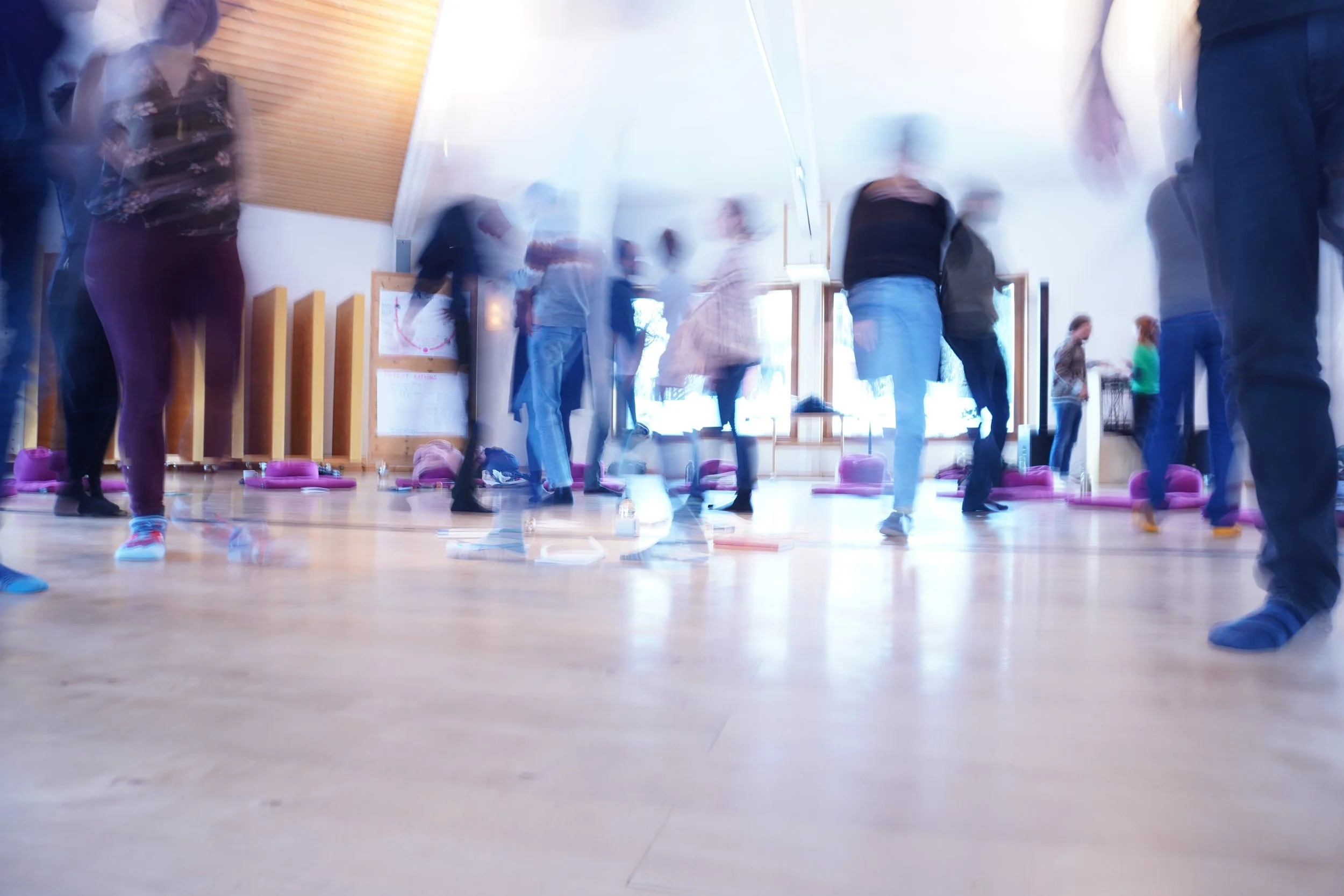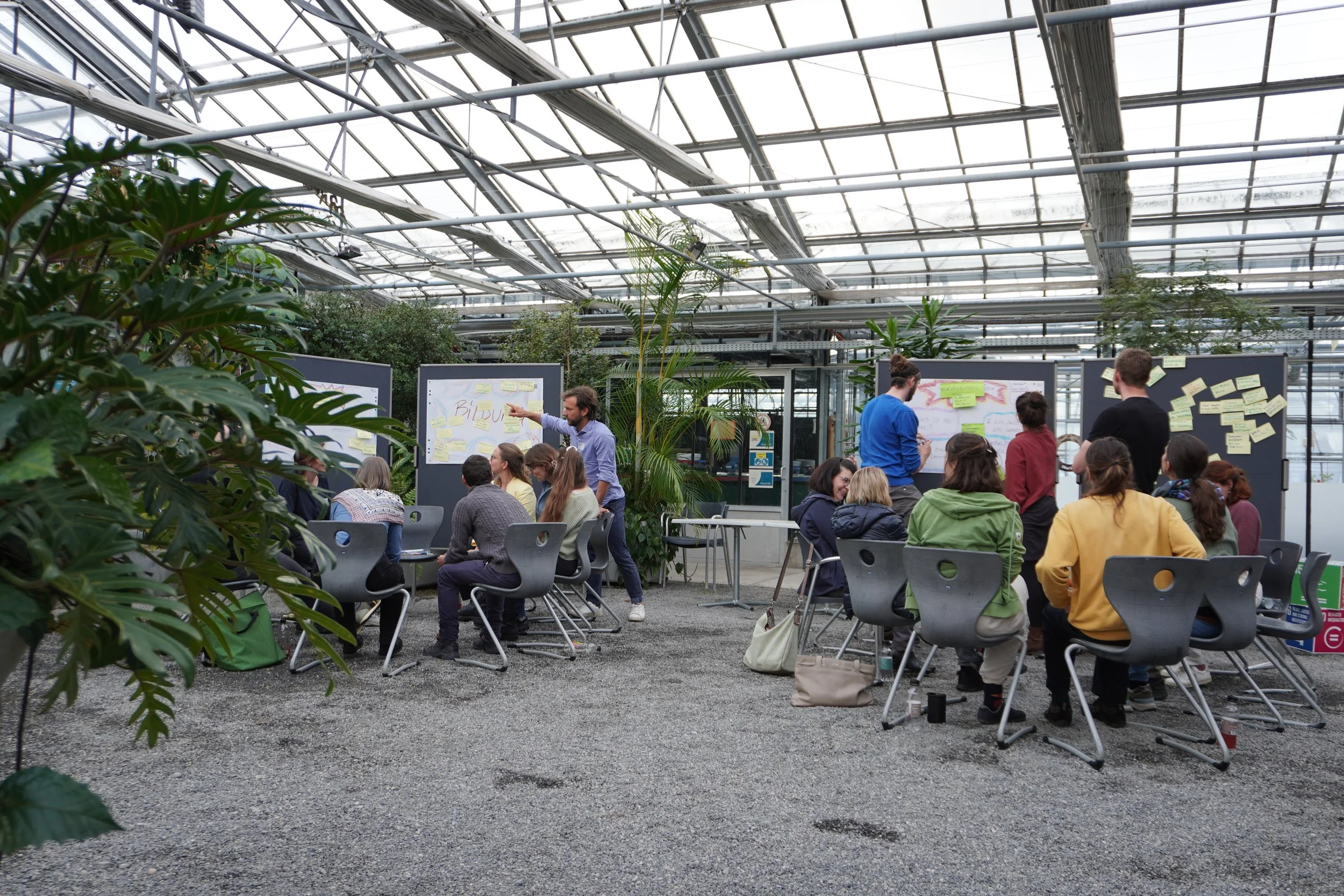
unser Blog
Storytelling - Kollektives Lernen von Geschichten
Am 15. Februar 2018 kamen in Bern 250 Menschen zusammen, um das Sustainable Development Solutions Network Schweiz SDSN zu lancieren und um die Schweiz einige Schritte weiter in Richtung Agenda 2030 zu bewegen.
in allen Sprachen
Since 2017, collaboratio helvetica has worked tirelessly to promote and catalyse systems change, helping individuals and organisations tackle complex societal challenges towards the SDGs, and advancing the conversation around sustainable transformation in Switzerland. In 2024, we embarked on a strategy revision process to clarify our focus, while also addressing the financial challenges that many non-profit organisations face.
In this blog post, Marie-Claire Graf, Catalyst from the cohort 2021-2022, gives insight into her project and the impact collaboratio helvetica and the community still has on her.
Human - or sociometric - mapping is a technique in group processes that invites participants to physically position themselves on imaginary spectrums, circles or clusters in relation to certain statements and questions. Read on to find out why we at collaboratio helvetica are using it so often, and how it can backfire.
We often picture collaboration as a harmonious exchange of ideas, a well-oiled machine churning out success. But beneath the surface, unseen forces can disrupt this dynamic. Trauma, whether a past event or chronic stress, can leave its mark on our nervous system, impacting how we interact with colleagues. In this blog post, Matthias Ryffel discusses how trauma can impact collaboration at the workplace and how a trauma-informed approach can foster healing processes for a better work environment.
In Western society, intelligence is often equated with intellectual prowess – the ability to reason, analyse, and problem-solve. This logical, linear approach to knowing, championed by Descartes' famous dictum "cogito, ergo sum" (I think, therefore I am), has driven immense scientific advancement. However, over-reliance on this kind of knowledge may leave us disconnected from ourselves and the world around us.
In this blog post, Catalyst and facilitator Alexandra Choutko explores the importance of cultivating intuition to face the challenges of our time.
Back in autumn 2023, ZHAW sustainable approached collaboratio helvetica, looking for a partner to design a dialogue series that would create tangible touchpoints with the recently published ZHAW Sustainability Report 2023. In this blog post, Kaspar Paur shares insights regarding the design, impact, and learnings of this project.
Alexandra Choutko is an experienced facilitator, and Catalyst from the Catalyst Lab cohort 2023–2024. With this blog post, she shares her personal experiences that have brought her to where she is now, and where her initial sense of disconnection in the Catalyst Lab led her to create an intervention in the form of a radical honesty workshop.
In this podcast, Catalyst Walter Zueck talks about his experiences in the Catalyst Lab. Colette from our team asked him how he came to the Catalyst Lab, what his first impressions were and why it was worthwhile for him to take part in this unique learning journey.
Peer reviews are an essential component for continuous improvement and accountability within any team. In a team working with Sociocracy 3.0 (S3.0), peer reviews can be particularly powerful as they align with the principles of collaboration, consent-based decision-making, and decentralised governance.
This’s a guide on how to conduct effective peer reviews in a team using Sociocracy 3.0.
Daphne Bucher looks back at seven successful years at collaboratio helvetica. In this blog post, she talks about her learnings regarding power dynamics, self-responsibility, and personal growth in a self-organised start-up environment.
July 11, 2024, Bern – Collaboratio helvetica is experimenting with a new value-based pricing model for the Catalyst Lab. In September 2024 collaboratio helvetica launches the fifth edition of Catalyst Lab, their flagship learning program for awareness-based system change on the topic of intergenerational combining. The aim is to explore how to merge future needs with the demands of the present through collective learning and new ways of collaboration.
Collaboratio helvetica designed and facilitated an international and multilingual workshop for the Biodiversity Lab, a project by the Swiss association Brainforest.
Jose Antonio Gordillo Martorell is the founder of Cultural Inquiry, and Catalyst from the Catalyst Lab cohort 2023–2024. With this blog post, he shares his personal experiences that have brought him to where he is now, and how the Catalyst Lab has empowered his personal growth along his journey towards change.
Ever had those moments at gatherings where you left feeling like you didn't really learn anything about how people are doing? Or spent countless hours with family, yet still feel like they don't truly know you? In some social circles, it's always the same voices dominating the conversation, making it exhausting. 😓 And meeting new people? Breaking through the ice can be tough.
Zusammen mit Impact Hub Zürich und One Planet Lab hat collaboratio helvetica den Changemaker Workshop Bundling Forces organisiert.
Collaboratio helvetica is self-organised and operates along the collaboration principles of Sociocracy 3.0. The collective decision was taken to embark on a learning journey and to explore the Conscious Leadership approach by the Conscious Leadership Group.
Von September bis Oktober 2023 fand das Protein Lab statt, ein kollaboratives Projekt der drei Organisationen Sentience, der Berner Fachhochschule BFH und collaboratio helvetica. Die Workshopreihe zielte darauf ab, sektorübergreifende Lösungen für den Wandel des Ernährungssystems zu entwickeln.
Das Protein Lab soll die dringend notwendige Proteinwende in der Schweiz vorantreiben. Im September 2023 startet das Projekt, das ausgewählte Expertinnen und Experten aus verschiedenen Sektoren zusammenführt, um Lösungen für ein nachhaltiges Ernährungssystem zu erarbeiten – mit Fokus auf alternative Proteine.
Nora Wilhelm and Diana Oser from collaboratio helvetica traveled to Alpbach in Austria to give speeches and workshops on the topics of transformation and systems change at the Convention4u 2023.
The iceberg model reveals deeper aspects of social and environmental challenges. Take plastic pollution in oceans: cleaning is crucial, but without addressing the root causes, we're stuck in a cycle. We must question the structures, laws, and mindsets that perpetuate this issue. Read our insightful blog post on understanding and addressing the iceberg model. Let's avoid repeating history and move beyond surface-level fixes to create lasting change.
Le HUB de l'Université de Lausanne organisait mercredi 3 mai la deuxième édition du Forum de l'Innovation Sociale. «Ensuite, nous devrions réfléchir de manière systémique. Les personnes qui ont un même but restent souvent dans une logique de compétition, de combat, alors qu'elles pourraient avoir une logique de collaboration. Il faut trouver de nouvelles manières de penser et de procéder pour adresser les défis sociaux et écologiques complexes» - Nora Wilhelm
The term social innovation has become a buzzword, but it’s important to keep in mind that there is no one single definition that everyone using it agrees upon. Put simply, social innovation is about addressing the challenges humanity is facing, such as climate change, biodiversity loss, poverty, and gender equity - just four of the many challenges contained in the Sustainable Development Goals (SDGs). Social innovators are the people deploying different types of strategies to address these challenges.
This year’s International Cooperation Forum, organised by the Swiss Agency for Development and Cooperation (SDC), was held in Geneva alongside a vibrant and inspiring group of partners, youth ambassadors, educators, social innovators, and professionals from around the globe.
Funders typically go through a cyclical process when fulfilling their purpose. They strategise and make key decisions about what should be funded and how, to what end. Then, those who choose to be transparent communicate about this strategy and the process that enables it, for example with a call for applications or a page on their website explaining their funding approach and who is eligible…
What a beautiful get-together with about 70 participants from our community and partners we celebrated 5 years of co-creation, system change and collaboration. It fills us with hope and happiness to see all those people willing and engaged in co-shaping the Switzerland you want to live in. Many thanks to everyone who came to our celebration with your presence and warmth. We feel nourished by your trust, warmth and connection. Have a look at some impressions here!
Wie soll eine Ernährungspolitik für die Schweiz aussehen, die bis 2030 allen Menschen gesunde, nachhaltige, tierfreundliche und fair produzierte Lebensmittel zur Verfügung stellt? Zu dieser Frage hat sich während fast 6 Monaten der erste nationale Bürger:innenrat getroffen.
When one thinks of plastic waste, the Swiss watch industry is probably not the first that comes to one’s mind. But plastic pollution is a global challenge and Breitling in its 2021 Sustainability Mission Report, Breitling committed to achieving zero plastic waste across operations by 2025. To engage key internal and external stakeholders on this ambitious goal, Breitling is collaborating with collaboratio helvetica and Let's Talk Waste. Earlier this year, stakeholders were invited to deepen their understanding of the topic and to reflect on how Breitling can most efficiently and meaningfully achieve its target.
20 Minuten berichtet über die Kritik von Eltern und Lehrern an Schulen als “starres Konzept”. Catalyst Nils Landolt spricht über seine Erfahrungen als Lehrer an der Schule und weshalb er eine eigene Schule gegründet hat.

















































